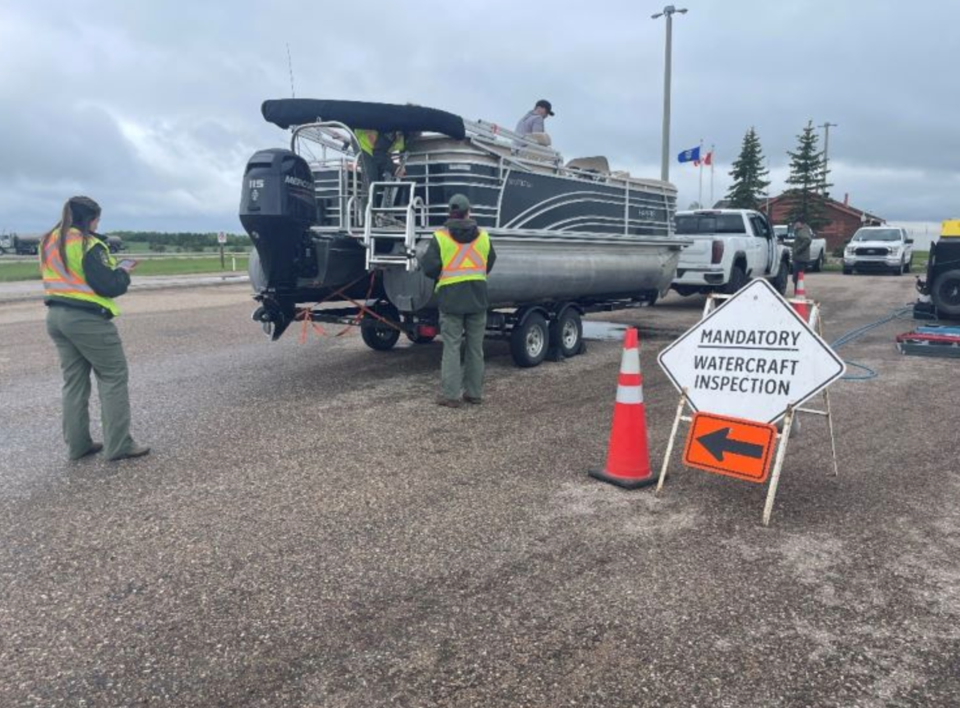BOW VALLEY – The Alberta government is stepping up efforts to prevent destructive aquatic invasive species from entering lakes and rivers with the highest fines in North America.
Starting on Thursday, June 20, fines for failing to stop with a trailered boat at an open inspection station jump from $324 to $4,200 and will rise from $180 to $600 for failing to remove a bilge plug when transporting a watercraft on a roadway.
Officials say this will help make sure that boats are properly drained and inspected before entering Alberta, which is currently free of zebra and quagga mussels that can easily spread through boats travelling across borders.
“We are setting the highest fines in North America because we want everyone to take inspection and detection seriously,” said Rebecca Schulz, Alberta’s environment and protected areas minister.
If these tiny invaders get established in Alberta, they can spread rapidly, harm ecosystems, clog waterways and infrastructure, and cause hundreds of millions of dollars in damages.
Last month, the province launched its new aquatic invasive species task force in its fight to keep Alberta free of zebra and quagga mussels and other aquatic invasive species.
The task force’s marching orders included identifying ways to improve inspection, detection and education, and assess strong penalties, so these non-native species don’t make it into Alberta.
The new task force will work with partners to discuss critical topics like how to improve border protections, and find ways to strengthen the province’s rules and programs.
This comes after the province invested $2.5 million to expand the number of fixed inspection stations to seven and launched a new roving crew, increasing the number of inspectors to 50, from 35 last year.
The inspection stations are also open longer this year, starting in April and running through the September long weekend, with many extending beyond this period.
Watercraft inspections have been mandatory in Alberta since 2015.
Parks Canada, which invested $14.7 million over six years from 2020-26 to stop the spread of aquatic invasive species in the mountain national parks, welcomed the province’s actions.
Parks has been grappling with whirling disease, a deadly fish disease, and has closed off all waterbodies in Yoho and Kootenay national parks.
Justin Brisbane, a spokesperson for Parks Canada, said the federal agency is using an aquatic invasive species management strategy that is widely used across western North America and is founded on four main components: prevention, early detection, rapid response, and species management.
He said management actions under this strategy are adaptive to the specific circumstances in each national park, changing conditions and the best available information at the time.
“Preventing the introduction and spread of aquatic invasive species in regional watersheds is a shared responsibility,” said Justin Brisbane, a spokesperson for Parks Canada, in an email.
“Parks Canada is committed to working with neighbouring provinces and partners and is supportive of efforts to prevent the spread of aquatic invasive species.”
Some aquatic invasive species, such as zebra and quagga mussels, can survive for nearly 30 days out of water
More and more detections are being reported across Canada and the United States, increasing the threat to Alberta.
According to the province, 38 boaters received charges or warnings for failure to stop at an open inspection station in 2023 and six were charged or warned for transporting a watercraft with the drain plug still in.
Last year, Alberta inspected 8,818 boats, 19 of which were confirmed positive for invasive mussels – 17 of the boats came from Quebec, Ontario and Manitoba, two were coming from Michigan and Minnesota. Eleven of the boats were headed to final locations in British Columbia, seven to Alberta, and one to Alaska.




